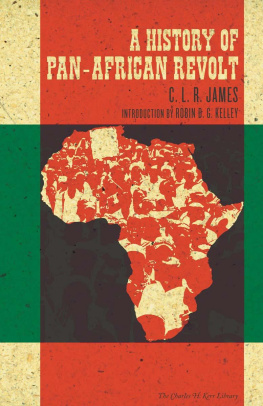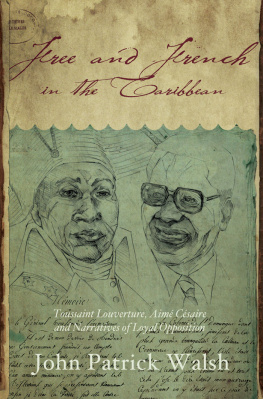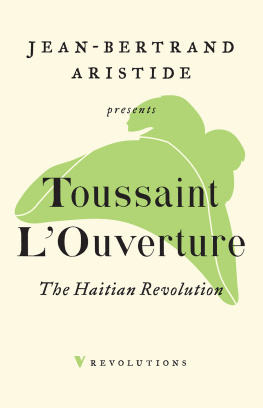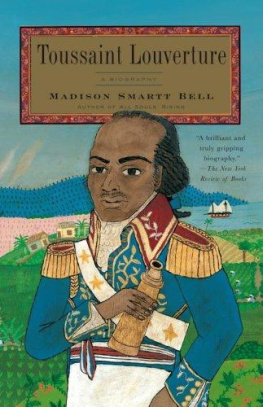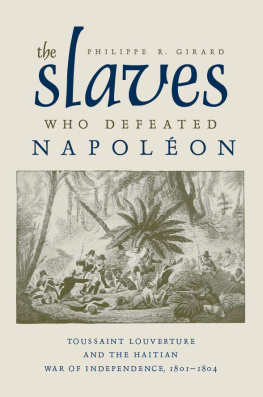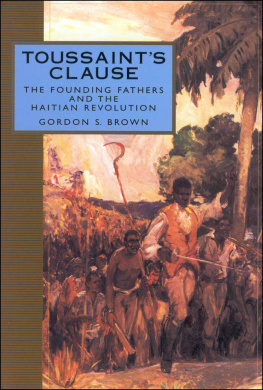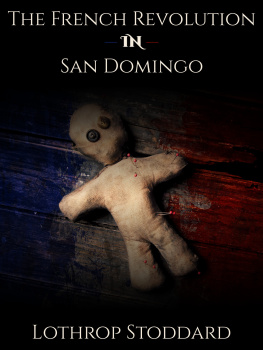PENGUIN BOOKS
THE BLACK JACOBINS
Cyril Lionel Robert James was born in Trinidad in 1901. He early on exhibited an ardent interest in literature and cricket two great passions that were to remain with him throughout his life. He became a schoolteacher in 1918, having received a classical British education with a scholarship to Queens Royal College in Trinidad. In 1932 James went to Britain to pursue a career as a writer and soon become cricket correspondent for the Manchester Guardian and the Glasgow Herald. After reading Trotsky's recently published History of the Russian Revolution, he was drawn to anti-Stalinist Marxism and quickly emerged as a leading theoretician of various Trotskyist organizations, developing his own independent brand of Marxism after World War II based on the theory of state capitalism. His most significant work was The Black Jacobins, completed in 1938, which, along with his History of Negro Revolt (1937), helped to lay the basis of the post-war movement for African emancipation. In 1953 James was deported from the United States because of his political activities, under the pretext of visa violations. He returned to live in England. In 1958, on a visit to Trinidad, he was invited by Eric Williams to become editor of the weekly Nation newspaper, the influential organ of Williams's People's National Movement (PNM). Following a bitter break with Williams over the direction of the PNM and the collapse of the abortive West Indies Federation, James returned to England. During his life he wrote a number of classic works, including World Revolution 1917 1936: The Rise and Fall of the Communist International (1937); Mariners, Renegades and Castaways: The Story of Herman Melville and the World We Live In (1953); Beyond a Boundary (1963), a memoir and cultural study of cricket; as well as several works on historical, political, and philosophical subjects. During the seventies, he taught in the United States and lectured widely in Europe, Africa, and the Caribbean. He lived in Brixton, London, until his death in 1989.
James Walvin is Professor of History at the University of York, where he has taught since 1967. He has published widely on the history of slavery and on modern social history. Among his books are Black Ivory (1994), An African's Life (1998), Making the Black Atlantic (2000) and Britain's Slave Empire (2000). Walvin is currently writing a history of the Caribbean.
C. L. R. JAMES
THE BLACK JACOBINS
TOUSSAINT L'OUVERTURE AND
THE SAN DOMINGO REVOLUTION
With an Introduction and Notes by James Walvin
PENGUIN BOOKS
To My Good Friends
HARRY and ELIZABETH SPENCER
of Nelson, Lancashire
PENGUIN BOOKS
Published by the Penguin Group
Penguin Books Ltd, 80 Strand, London WC2R 0RL, England
Penguin Putnam Inc., 375 Hudson Street, New York, New York 10014, USA
Penguin Books Australia Ltd, 250 Camberwell Road, Camberwell, Victoria 3124, Australia
Penguin Books Canada Ltd, 10 Alcorn Avenue, Toronto, Ontario, Canada M4V 3B2
Penguin Books India (P) Ltd, 11 Community Centre, Panchsheel Park, New Delhi 110 017, India
Penguin Books (NZ) Ltd, Cnr Rosedale and Airborne Roads, Albany, Auckland, New Zealand
Penguin Books (South Africa) (Pty) Ltd, 24 Sturdee Avenue, Rosebank 2196, South Africa
Penguin Books Ltd, Registered Offices: 80 Strand, London WC2R 0RL, England
www.penguin.com
First published 1938
Published with an Introduction in Penguin Books 2001
Copyright C. L. R. James,1938,1963,1980
Introduction and Notes copyright James Walvin,2001
All rights reserved
The lines on p.314 are from The Dry Salvages in Four Quartets by T. S. Eliot
The moral right of the author of the Introduction and Notes has been asserted
Except in the United States of America, this book is sold subject to the condition that it shall not, by way of trade or otherwise, be lent, re-sold, hired out, or otherwise circulated without the publisher's prior consent in any form of binding or cover other than that in which it is published and without a similar condition including this condition being imposed on the subsequent purchaser
ISBN: 978-0-14-193708-3
CONTENTS
INTRODUCTION
The history of black slavery in the Americas can be interpreted in terms of the slaves' persistent efforts to resist their bondage. But only once in St Domingue/Haiti did the slaves succeed in overthrowing the slave system. Under the shadow of the revolution in France after 1789, slaves in the French Caribbean colony of St Domingue rose up against one of the harshest of slave regimes in the Americas. In a protracted revolt which was, by turns, slave rebellion, anti-colonial war and race war (sometimes a mix of all three) the slaves of St Domingue became the free people of the republic of Haiti. C. L. R. James's book, The Black Jacobins, first published in 1938, was a pioneering account of that critical historical episode. Today, it is a classic which remains, sixty years on, the starting point for any student of the topic. Like all classics, however, The Black Jacobins transcends its immediate focus of interest to speak to wider, universal issues.
The heart of James's book is the slave experience. African slaves were basic to the shaping and development of huge areas of the Americas. Millions of Africans were violently recruited and shipped across the Atlantic in conditions which have come to haunt the public imagination. It is clear enough now that more than eleven million Africans were loaded onto the slave ships (European, North American and Brazilian) plying along the West African coast. In the region often million Africans survived the crossing. Today, when the study of Atlantic slavery attracts the efforts of armies of historians on both sides of the Atlantic, no serious scholar would deny the significance of this African diaspora, and of the Atlantic economy in which it played so seminal a role. It was not always so.
Among C. L. R. James's many great achievements is the fact that he was one of the first to recognize the importance of this historical formula. Yet it took a very long time for historians to recognize his pioneering importance. The re-publication of The Black Jacobins perhaps his most famous historical study Published in 1938, following path-breaking research in French archives, The Black Jacobins was far ahead of its time both in its focus and its approach. For a start, the history of the Caribbean and of slavery had, by the 1930s, drifted into virtual anonymity. The historiography of the region was moribund, and historians of colonial and imperial Europe concentrated their attention elsewhere. British academic historians were more likely to write about Wilberforce than the slaves. Indeed the scholarship on slavery and abolition had changed little in direction and tone for more than a century, and continued to concentrate on the rise of humanitarianism and its effective campaign in ending the cruelty of the slave system. C. L. R. James effectively turned the tide.
The Black Jacobins asserted and illustrated the importance of the Caribbean to the unfolding of Atlantic history. James's was an attempt not merely to shift the focus of imperial interests back to where it had once lain in the Atlantic economy but to explain slavery in the Americas as an integral theme in European development. The originality of James's book lies in its core argument that the revolution in San Domingo (Haiti) in the 1790s was pivotal for the whole region. Moreover in the unfolding of that revolution, the slaves were instrumental. Slaves secured their own freedom. Thus, at a stroke, the whole focus of attention was shifted onto the history of the slaves themselves. Effectively for the first time, James gave slaves an agency;
Next page

